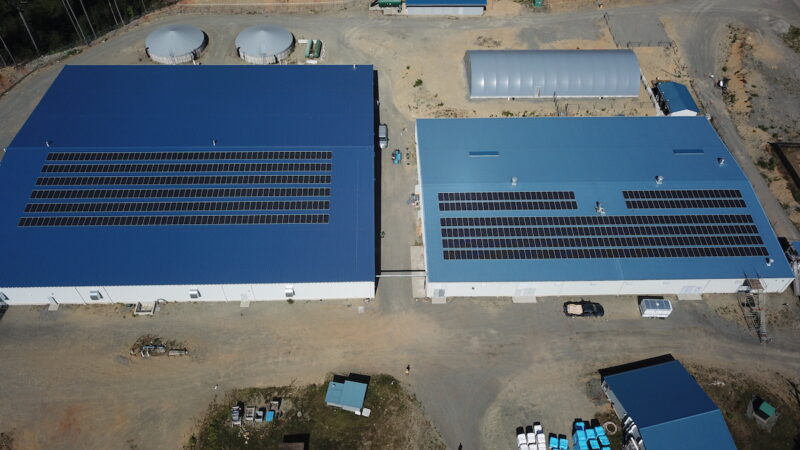Aquaculture carbon footprint study on BC salmon farms
Should BC succumb to the demands of anti-fish farm activists to move all ocean-based salmon farms to land based operations, the province will see a whopping increase of 22,881,000 kilograms of Greenhouse Gas (GhG) emissions.
By Fabian Dawson
SeaWestNews
The Government of Canada has hired a consultant to do a carbon footprint analysis on existing and emerging aquaculture production technologies to determine the future of salmon farms in British Columbia.
The tender for the analysis, expected next winter, has been awarded to Wood Environment & Infrastructure Solutions based in St. Johns, Newfoundland.
It remains to be seen how much weight the Liberal government will place on the analysis as much of its decision making regarding salmon farming in BC so far, has discounted science in favour of politics, activism and social licence.
The analysis follows the decision to phase out salmon farms in BC’s Discovery Islands by Federal Fisheries Minister Bernadette Jordan, despite her own scientists saying that the marine operations pose less than a minimal risk to wild fish migrating through the area.
She also ignored her deputy minister’s recommendation for a more coordinated approach to the closures, which was primarily pushed for by anti-fish farm activists
The Liberals, at the behest of the activists who have been demanding that ocean based farmers move their operations to grow fish in land-based tanks, have pledged to come up with a plan to transition open-net salmon farms in British Columbia’s waters by 2025.
Terry Beech, Parliamentary Secretary to the Minister of Fisheries, has said the future of salmon farming in BC could involve a range of technologies including hybrid grow-out operations, closed and semi-closed containment systems in the ocean together with an area-based management approach.
Department of Fisheries and Oceans (DFO) documents show that the consultant has been tasked with conducting a carbon footprint analysis of the following salmonid aquaculture production system technologies:
- land-based closed-containment (i.e. recirculating aquaculture systems [RAS]); floating closed-containment (semi-closed and/or fully closed);
- offshore technologies;
- hybrid systems (a combination of land-based closed-containment or floating semi-closed containment and traditional open net-pens), and;
- traditional open net-pens.
The consultant will also develop a case study for each of the production technologies, explaining the technology and the results of the carbon footprint analysis of each.
Studies on this issue have shown transitioning all open-net fish farms in British Columbia to land-based salmon farms operations requires the use of large amounts of land, water, and power, and thus has a significant environmental footprint, in particular greenhouse gas emissions.
Other challenges to land based RAS grow-out facilities include the global shortage of a trained workforce, fish health, broodstock development, stocking densities, and financial risks, according to The State of Salmon Aquaculture Technologies study released in February 2020.
Currently, B.C. ocean-based salmon farms emit only 2.2 kilograms of carbon dioxide for every kilogram of edible fish produced. That is less than half of any animal raised on land, including 5.1 kilograms of CO2 per kilogram of chicken, 6.4 kilograms for pork, and 37.2 kilograms for beef.

Should British Columbia succumb to the demands of anti-fish farm activists to move all ocean-based salmon farms to land based operations, the province will see a whopping increase of 22,881,000 kilograms of Greenhouse Gas (GhG) emissions, according to an independent study by RIAS Inc.
In Canada, the transfer of the current aquaculture production from sea to land would require 33,719 acres, or 159 sq. km of land – equivalent to 28,000 Canadian football fields – to grow fish in appropriate densities in land-based systems.
Among the latest innovative salmon farming technologies to be introduced in B.C. is a new Semi-Closed Containment System (SCCS) by Cermaq Canada, that went operational last fall at its Millar Channel farm site in Clayoquot Sound.
The new system will essentially eliminate lateral contact between wild and farmed salmon, – the central issue in the polarising debate over ocean-based fish farming in British Columbia.
Ottawa recently gave $752,247 to Cermaq Canada Ltd for the project in addition to $305,169 to Mowi Canada West to support the installation of an emissions-free solar power system at its Dalrymple Salmon Hatchery.
Other innovations being looked at include the ‘Egg’ closed-containment system, which involves growing salmon in semi-submerged tanks in the ocean, to prevent escapes and pathogen transfers from wild fish to farmed fish.
BC salmon farmers are also developing new land-based systems that will allow them to raise juvenile farmed salmon to larger, more robust sizes before transferring them to ocean-based grow-out systems.
This will significantly lower the length of time that the salmon spend in the ocean, thus effectively reducing production and environmental challenges related to sea lice infestation and potential interactions with wild salmon stocks.
Farmed Atlantic salmon is BC’s top seafood export with a total economic output of $1.6 billion. The industry currently supports nearly 6,500 full time jobs that pay 30% higher than BC’s median income.
(Submitted image of Mowi Canada West’s emissions-free solar power system at its Dalrymple Salmon Hatchery.)

